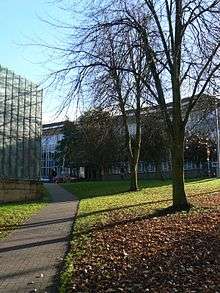Durham University Department of Physics
The Department of Physics at Durham University in Durham, England, is a large physics and astronomy department involved in both undergraduate teaching and scientific research. In the most recent subject review report by the Quality Assurance Agency (QAA) for Higher Education, the department achieved maximum marks (24/24)[1] and in the 2001 Research Assessment Exercise the department retained a Grade 5A rating.[2] In addition, the department's research into Space Science and Astrophysics was rated as number one in Europe and fourth in the world by Thomson Reuters from its Essential Science Indicators (1998–2008). [3]
 | |
Academic staff | 78 |
|---|---|
| 150 | |
| Location | , , |
| Campus | Science Site, Durham University |
| Website | www.dur.ac.uk/physics |
Location and admissions
The department is situated on the university's Science Site, on the south side of the city of Durham, 2 miles from Junction 62 of the A1(M) and approx 5 minutes drive from Durham Station.[4] Students are members of one of the 14 colleges in the city.
Each year the department admits around 170 students for degrees in physics, physics & astronomy and theoretical physics. The current standard conditional offer given to a student taking A-Level examinations is A*A*A, to include physics and mathematics.[5]
Admissions are processed through UCAS. In addition, an applicant must be accepted by one of the colleges of Durham University.[6]
Taught programmes
The department offers 3-year (bachelor's) undergraduate courses in physics and physics & astronomy, 4-year (master's) courses in physics, physics & astronomy and theoretical physics and also participates in joint honours and natural science programmes with other departments of the university. Taught and research based master's degrees and research based PhDs are available at postgraduate level.[7]
All research takes place within the department, whilst teaching also takes place in various locations around the university.
Research groups
The department maintains five research groups:
- Advanced Instrumentation
- Astronomy and Astrophysics
- Atomic and Molecular Physics
- Condensed Matter Physics
- Elementary Particle Theory
In addition the department is involved with the Institute for Computational Cosmology, the Institute for Particle Physics Phenomenology, the Photonic Materials Institute, the Centre for Renewable Energy, the Centre for Extragalactic Astronomy and the Biophysical Sciences Institute.[8]
Astronomy
.jpg)
The physics department is responsible for the Durham Astronomy Research Cluster.[9] The cluster consists of three branches; the Institute for Computational Cosmology, which focuses on theoretical research, the Centre for Extragalactic Astronomy, which focuses on observational research and the Centre for Advanced Instrumentation, which focuses on astronomical instrumentation.
In 2008, Durham was ranked number one in Europe and fourth in the world for research into Space Science (which covers research into astronomy and astrophysics) over the decade 1998 to 2008, according to the league table by Thomson Reuters Essential Science Indicators published in the Times Higher Education.[10][11] Again in 2014, The Thomson Reuters list of the “World’s most influential scientific minds 2014” also saw Durham ranked first in Europe and sixth in the world for the influence of its Space Science researchers.[12]
History
Astronomy within the department dates back to 1975.[13] The scope of activity has grown substantially since then and it is now one of the largest astronomy groups in the UK and Europe.[14]
In November 2016, the brand new Ogden Centre for Fundamental Physics building, designed by the world renowned Studio Daniel Libeskind was opened.[15] The new building now houses all three astronomy groups of the Durham Astronomy Research Cluster.
Centre for Extragalactic Astronomy
In order to mark the 40th anniversary of Durham astronomy, and to recognise the scale of the observational research activity at Durham, the Centre for Extragalactic Astronomy (CEA) was founded in 2015. Prior to this it was known as the Extragalactic Astronomy and Cosmology Group.[13]
The research conducted at the CEA covers a broad variety of extragalactic astrophysics, including: the formation and evolution of galaxies, observational surveys, active galactic nucleui (AGN), cluster of galaxies and the intergalactic medium.[14] It also covers research into accretion onto black holes.
The CEA consists of 20 faculty members, 12 postdoctoral researchers and 25 postgraduate researchers (correct as of December 2018).[16] The founding director of the CEA was Professor Ian Smail. The current director, (correct as of December 2018), is Professor David Alexander.[17]
Ogden Professor of Fundamental Physics
The Ogden Professor of Fundamental Physics is a professorship or chair in the Department of Physics at Durham University. The chair is named after Sir Peter Ogden. The chair was established in 2001, following a benefaction from Sir Peter.[18]
List of Ogden Professors
- Professor Carlos Frenk 2001–present [19]
Notable staff
The department's staff includes 24 professors, 6 readers, 8 senior lecturers, 9 lecturers, about 50 post-doctoral researchers and fellows and 90 PhD postgraduate students.[20][21] These include:
- Simon Morris, head of department
- Céline Bœhm, professor of physics
- Martyn Chamberlain, professor of applied physics (2003 to 2011)
- John Alan Chalmers, professor of atmospheric physics (1928 to 1967)
- Temple Chevallier, professor of mathematics and astronomy (1841 to 1871)
- Shaun Cole, professor of physics
- David Fairlie, emeritus professor of physics
- David Flower, atomic and molecular physics
- Richard Keith Ellis FRS, director of the IPPP
- Richard Ellis FRS, professor of physics (1974 to 1993)
- David Flower, emeritus professor of physics
- Carlos Frenk FRS, Ogden Professor of Fundamental Physics
- Nigel Glover FRS, professor of physics
- Ruth Gregory, professor of mathematics and physics
- Alexander Stewart Herschel FRS FRAS - First professor of physics at Durham (1871 to 1886)
- Jeremy Hutson FRS, professor of chemistry and physics
- Gordon D. Love, professor of physics
- Alan Martin FRS, emeritus professor of physics
- Richard Massey, professor of physics
- Tom McLeish FRS, professor of physics (2008 to 2018)
- George Rochester FRS, professor of physics (1955 to 1973)
- Sir Gareth Roberts FRS FREng, Professor of Applied Physics (1976 to 1985)
- F. Richard Stephenson, emeritus professor of physics
- James Stirling FRS, professor of physics (1986 to 2008)
- Brian Keith Tanner, emeritus professor of physics
- Richard S. Ward FRS, Professor of Theoretical Physics
- Sir Arnold Wolfendale FRS, emeritus professor of physics and former astronomer royal (1956 to 1992)
PhysSoc
The Durham University Physics Society (PhysSoc) is mostly made up of Physics Undergraduates from the department but is open to a wider audience, aiming to "bring together undergraduates with an interest in Physics, with an aim to further their understanding and interest in the most fundamental science." It runs a regular series of lectures and socials as well as hosting visits to national and international Physics facilities such as JET and CERN.
Alumni
- Aba Andam - Professor of physics at Kwame Nkrumah University of Science and Technology and president of the Ghana Academy of Arts and Sciences
- David Axon - Former Head of the School of Mathematical and Physical Sciences at the University of Sussex and professor of physics
- John D. Barrow FRS - Professor of Mathematical Sciences at Cambridge University
- William Bullerwell FRS FRSE - Chief Geophysicist and Deputy Director of the Institute of Geological Sciences in Britain
- Ian Chapman - Chief Executive of the United Kingdom Atomic Energy Authority
- Fran Clough - former England rugby union player
- Jonathan Edwards - former UK triple jumper and Olympic record holder
- George Efstathiou FRS - Professor of Astrophysics (1909) at Cambridge University
- Elspeth Garman - Professor of molecular biophysics at the University of Oxford
- Monica Grady - Professor of Planetary and Space Science at the Open University
- Edwin Hancock - Emeritus professor at the University of York
- M. A. Wazed Miah - Chairman of the Bangladesh Atomic Energy Commission
- Ben Moore - Professor of physics at the University of Zurich
- Denis Osborne - British High Commissioner to Malawi
- Howard Penman FRS - Meteorologist and researcher at Rothamsted Research
- Arthur Prowse - Principal of Van Mildert College
- Lewis Fry Richardson FRS - noted for Modified Richardson iteration
- Brian Ridley FRS - Emeritus professor at the University of Essex
- Caleb Scharf - director of the Columbia Astrobiology Center at Columbia University
- Michelle Simmons FRS - Professor of physics at University of New South Wales
- William Stephenson - developer of Q methodology
- Samuel Tolansky FRS FRAS - Former professor of physics at Royal Holloway, University of London
- Sarah Thompson MBE - Professor of physics and former head of department at the University of York
- Philip Woodworth FRS - Emeritus professor at the National Oceanography Centre
References
- QAA - Report on University of Durham, Physics and Astronomy Archived 9 January 2006 at the Wayback Machine, QAA, UK. Retrieved 1/10/09.
- Research Assessment Exercise, UK. Retrieved 1/10/09.
- "Institutional rankings in space sciences". Times Higher Education Supplement. Retrieved 31 January 2009.
- Durham University Physics Department - Location, Durham University, UK. Retrieved 1/10/09.
- Durham University Department of Physics - Undergraduate Courses, Durham University, UK. Retrieved on 4 November 2015.
- Durham University Department of Physics - How to apply, Durham University, UK. Retrieved on 1 September 2009.
- Durham University Physics Department - Courses, Durham University, UK. Retrieved 1/10/09.
- Durham University Physics Department - Research, Durham University, UK. Retrieved 1/10/09.
- "Astronomy at Durham University". 26 December 2018. Archived from the original on 26 December 2018. Retrieved 28 December 2018.
- "Institutional rankings in space sciences". Times Higher Education (THE). 28 August 2008. Retrieved 28 December 2018.
- "Screenshot of league table". astro.dur.ac.uk. Retrieved 28 December 2018.
- "Durham University named Europe's leading centre for space science researchers - Durham University". www.dur.ac.uk. Retrieved 28 December 2018.
- "Astronomy group - Durham University". 22 November 2013. Archived from the original on 22 November 2013. Retrieved 28 December 2018.
- "Centre for Extragalactic Astronomy Durham University". astro.dur.ac.uk. Retrieved 28 December 2018.
- "Daniel Libeskind completes larch-clad cosmology centre for Durham University". Dezeen. 6 March 2017. Retrieved 29 December 2018.
- "Centre for Extragalactic Astronomy Durham University". astro.dur.ac.uk. Retrieved 28 December 2018.
- "Prof DM Alexander". Durham University. Retrieved 21 March 2020.
- http://www.dur.ac.uk/resources/physics/research/strategy/ResStrategyMarch05.pdf
- http://www.stfc.ac.uk/News+and+Events/11927.aspx
- Durham University Physics Department - About, Durham University, UK. Retrieved 1/10/09.
- Durham University Physics Department - Staff, Durham University, UK. Retrieved 1/10/09.
